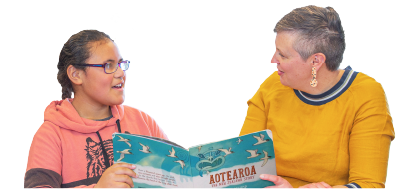Using Tapasā
Show video transcript
Title slide: Be a learner using Tapasā
Jane Clifford, Teacher, Hornby Primary School, Christchurch, facing camera
So when I came to this school I researched that there was a large Pasifika family, Pasifika community. I didn't know my experience, there wasn't a lot of experience that I had with the Pasifika community so I went to the Tapasā and I was just leafing through and what really caught my eye was the section on page seven that actually talks about what stood out to me was what Pacific communities and family and learners would expect from a teacher. I zoned right in on that and the first few things were; learn to pronounce my name correctly, and I thought well that can't be so hard. Turns out pronunciation is a tricky thing but I use the experts in my class all the time. I'm not frightened to say, ‘Oh am I saying that right, can you tell us how to say the day of the week today?’ Sometimes we've really got stuck on trying to pronounce some words right and gone over and over but just using those students as the experts. I then saw - learn a few greetings in my home language. Again that's something that anyone can do.
Students playing outside
Understand that I learn differently - well, we watch our children before school play and we've watched our Pasifika children, we watch all our children and how they engage in how they play and interact and we've taken those things into our learning programme.
Jane Clifford, Teacher, Hornby Primary School, Christchurch, facing camera
We have a lot of dramatic play to help with our reading comprehension for example and that's been a key question for Georgia and myself about how children can learn to understand reading concepts and we've noticed that our Pasifika children like dramatic play as a way of learning so we've incorporated that into our reading programme. Engage and knowing that I enjoy, I value church and spirituality, that's another aspect. Well, we're always asking at news time what you've been doing at church at the weekend and what especially around certain celebrations.
If I had one tip for teachers it would be, another tip from the Tapasā page 7 was don't be frightened to ask questions and I've taken, really taken that to heart; not being frightened to ask children questions. Not be frightened to get pronunciation wrong and show that I give it a go but follow up with the question of ‘Have I pronounced that right? Can you help me?’ has made a really big difference to, again to just getting things right at school but also asking questions of the community. I've been out in the car park talking to people in their car and asking them a question about you know...asking them questions there.
This video is about being a teacher using Tapasā. Jane Clifford, from Hornby Primary School, talks about her first encounter with a Pacific community and how she uses Tapasā as a guide to what Pacific learners, families, and communities expect from a teacher. Simple things like pronunciation and learning a few greetings in Pacific home languages might sound simple but can be quite challenging. Engaging and knowing your Pacific learner is the key; finding out what Pacific learners are most interested in and incorporating that into their learning. Tapasā is a two-way learning journey and a valuable tool that can be used to pause and ask questions about your personal cultural capability.
Reflections for individual teachers
This video explores beliefs and actions teachers develop within their teaching approaches using Tapasā.
- Have you engaged in Tapasā workshop/training? If yes, how do you use Tapasā to understand your learners’ cultures as a building block for your own learning and practice? If no, have you heard of, or read about Tapasā? Share your thoughts.
- How can you use Tapasā to engage with all Pacific learners in their learning and make the classroom a positive learning experience for them? Think about how you will contextualise your teaching and learning in a Pacific learner setting.
- How can you build and grow your cultural understanding at different stages of your teaching journey? Reference the Tapasā framework and indicators to keep track of where you are at each stage and your understanding of expected behaviours at that stage.
- How can Tapasā assist in your reflection and learning inquiries?
Reflections for staff or departments
If you are a staff member or member of a department team, find out if your school has engaged in Tapasā as a guide to help navigate your journey of becoming more culturally aware and competent in engaging with Pacific learners and their families.
- How does your school use Tapasā in conjunction with the Standards for the Teaching Profession and The Code of Professional responsibility?
- What other culturally responsive resources does your school use to complement Tapasā to support governance, strategic and programme planning, developing local curriculum, induction, mentoring and appraisals, and professional learning and development?
Does your school provide teacher training on Tapasā? What was the feedback on how the programme design responds to their needs? How can/do your staff get the most out of Tapasā? Share feedback.

